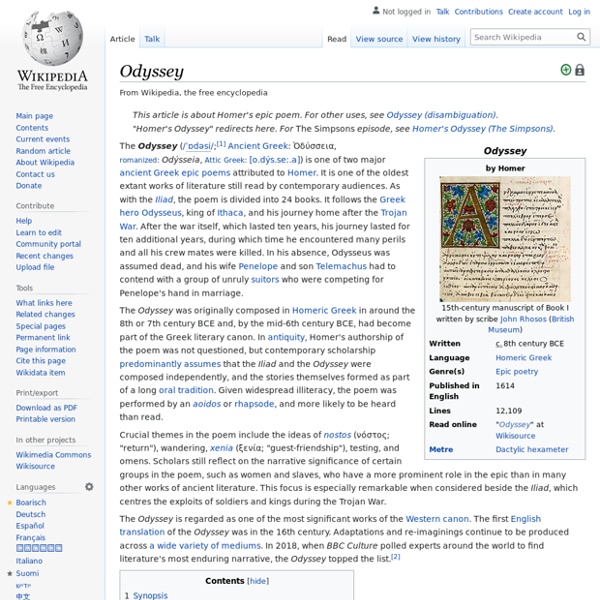Thoth
Thoth (; from Koinē Greek: Θώθ thṓth, borrowed from Coptic: Ⲑⲱⲟⲩⲧ, the reflex of Ancient Egyptian: ḏḥwtj "[He] is like the Ibis") is one of the ancient Egyptian deities. In art, he was often depicted as a man with the head of an ibis or a baboon, animals sacred to him. His feminine counterpart was Seshat, and his wife was Ma'at.[1] He was the god of wisdom, writing, hieroglyphs, science, magic, art, judgment, and the dead. Thoth's chief temple was located in the city of Hermopolis (Ancient Egyptian: ḫmnw /χaˈmaːnaw/, Egyptological pronunciation: "Khemenu", Coptic: Ϣⲙⲟⲩⲛ Shmun). Later known as el-Ashmunein in Egyptian Arabic, it was partially destroyed in 1826.[2] Name[edit]
oceanus.html
Oceanus was an ancient Greek god. According to one version, he was born by the union of the primal gods Chaos and Gaea, sanctified by god Eros. Another version has it that he was one of the twelve Titans, thus a son of Gaea and Uranus. Oceanus was married to his sister, Tethys, with whom he had numerous children, called Oceanids. These were the lesser gods and goddesses of the rivers, the sea, and the springs.
Ammit
Ammit (; Ancient Egyptian: ꜥm-mwt, "devourer of the dead";[1] also rendered Ammut or Ahemait) was a demoness and goddess in ancient Egyptian religion with a body that was part lion, hippopotamus, and crocodile—the three largest "man-eating" animals known to ancient Egyptians. A funerary deity, her titles included "Devourer of the Dead", "Eater of Hearts", and "Great of Death".[3] Ammit lived near the scales of justice in Duat, the Egyptian underworld. In the Hall of Two Truths, Anubis weighed the heart of a person against the feather of Ma'at, the goddess of truth, which was depicted as an ostrich feather (the feather was often pictured in Ma'at's headdress).
www.britannica
Oceanus, in Greek mythology, the river that flowed around the Earth (conceived as flat), for example, in the shield of Achilles described in Homer’s Iliad, Book XVIII. Beyond it, to the west, were the sunless land of the Cimmerii, the country of dreams, and the entrance to the underworld. In Hesiod’s Theogony, Oceanus was the oldest Titan, the son of Uranus (Heaven) and Gaea (Earth), the husband of the Titan Tethys, and father of 3,000 stream spirits and 3,000 ocean nymphs. In the Iliad, Book XIV, Oceanus is identified once as the begetter of the gods and once as the begetter of all things; although the comments were isolated, they were influential in later thinking.
Palermo Stone
Fragment of a stele known as the Royal Annals of the Old Kingdom of Ancient Egypt The Palermo Stone, the fragment of the Egyptian Royal Annals housed in Palermo, Italy. The Palermo Stone is one of seven surviving fragments of a stele known as the Royal Annals of the Old Kingdom of Ancient Egypt. The stele contained a list of the kings of Egypt from the First Dynasty (~3150–2890 BCE) through to the early part of the Fifth Dynasty (approx 2392–2283 BCE) and noted significant events in each year of their reigns.
www.greekboston
Written by GreekBoston.com in Greek Mythology When most of us think about the sea as it relates to Greek mythology, we usually envision Poseidon, who is the god of the sea. However, there is a lot more to it than that.
Inanna
Ancient Mesopotamian goddess Inanna-Ishtar's most famous myth is the story of her descent into and return from Kur, the ancient Sumerian Underworld, a myth in which she attempts to conquer the domain of her older sister Ereshkigal, the queen of the Underworld, but is instead deemed guilty of hubris by the seven judges of the Underworld and struck dead. Three days later, Ninshubur pleads with all the gods to bring Inanna back, but all of them refuse her except Enki, who sends two sexless beings to rescue Inanna. They escort Inanna out of the Underworld, but the galla, the guardians of the Underworld, drag her husband Dumuzid down to the Underworld as her replacement. Dumuzid is eventually permitted to return to heaven for half the year while his sister Geshtinanna remains in the Underworld for the other half, resulting in the cycle of the seasons.
librivox
HOMER (c. 8th cen - c. 8th cen) and Samuel BUTLER (1835 - 1902) The Odyssey is one of the two major ancient Greek epic poems (the other being the Iliad), attributed to the poet Homer. The poem is commonly dated to between 800 and 600 BC. The poem is, in part, a sequel to the Iliad, and concerns the events that befall the Greek hero Odysseus in his long journey back to his native land Ithaca after the fall of Troy.



